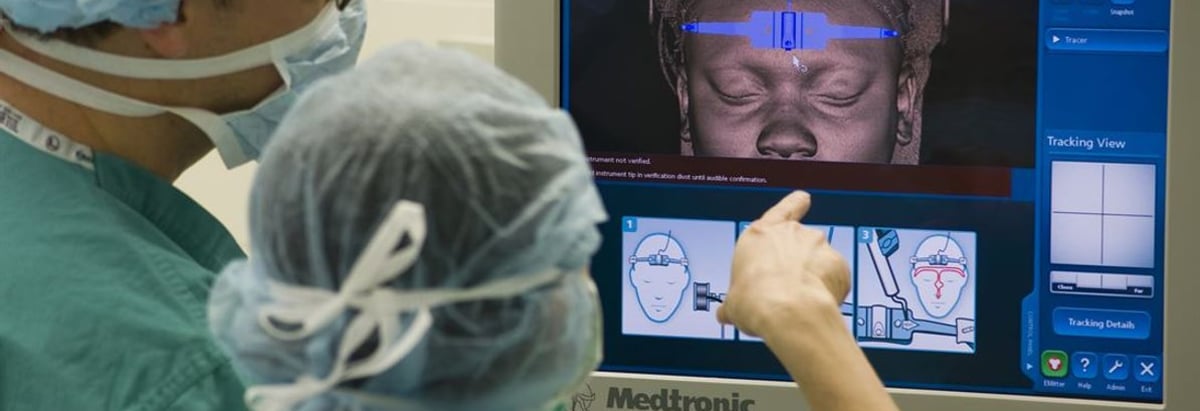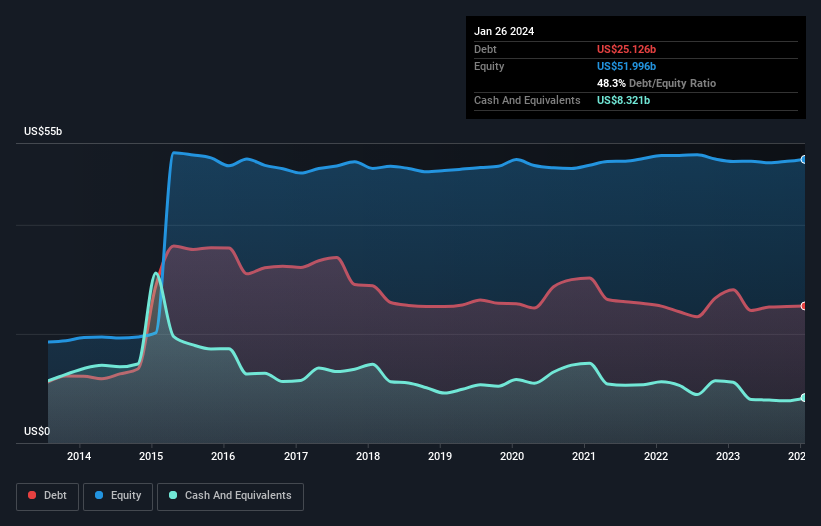- United States
- /
- Medical Equipment
- /
- NYSE:MDT
These 4 Measures Indicate That Medtronic (NYSE:MDT) Is Using Debt Reasonably Well

Legendary fund manager Li Lu (who Charlie Munger backed) once said, 'The biggest investment risk is not the volatility of prices, but whether you will suffer a permanent loss of capital.' So it might be obvious that you need to consider debt, when you think about how risky any given stock is, because too much debt can sink a company. As with many other companies Medtronic plc (NYSE:MDT) makes use of debt. But the real question is whether this debt is making the company risky.
What Risk Does Debt Bring?
Debt is a tool to help businesses grow, but if a business is incapable of paying off its lenders, then it exists at their mercy. If things get really bad, the lenders can take control of the business. However, a more common (but still painful) scenario is that it has to raise new equity capital at a low price, thus permanently diluting shareholders. Of course, debt can be an important tool in businesses, particularly capital heavy businesses. The first thing to do when considering how much debt a business uses is to look at its cash and debt together.
See our latest analysis for Medtronic
What Is Medtronic's Debt?
The image below, which you can click on for greater detail, shows that Medtronic had debt of US$25.1b at the end of January 2024, a reduction from US$28.1b over a year. However, because it has a cash reserve of US$8.32b, its net debt is less, at about US$16.8b.

A Look At Medtronic's Liabilities
The latest balance sheet data shows that Medtronic had liabilities of US$9.79b due within a year, and liabilities of US$29.0b falling due after that. Offsetting this, it had US$8.32b in cash and US$5.97b in receivables that were due within 12 months. So its liabilities outweigh the sum of its cash and (near-term) receivables by US$24.6b.
While this might seem like a lot, it is not so bad since Medtronic has a huge market capitalization of US$113.1b, and so it could probably strengthen its balance sheet by raising capital if it needed to. But we definitely want to keep our eyes open to indications that its debt is bringing too much risk.
We use two main ratios to inform us about debt levels relative to earnings. The first is net debt divided by earnings before interest, tax, depreciation, and amortization (EBITDA), while the second is how many times its earnings before interest and tax (EBIT) covers its interest expense (or its interest cover, for short). This way, we consider both the absolute quantum of the debt, as well as the interest rates paid on it.
Medtronic's net debt to EBITDA ratio of about 1.9 suggests only moderate use of debt. And its commanding EBIT of 46.4 times its interest expense, implies the debt load is as light as a peacock feather. We saw Medtronic grow its EBIT by 7.4% in the last twelve months. That's far from incredible but it is a good thing, when it comes to paying off debt. When analysing debt levels, the balance sheet is the obvious place to start. But it is future earnings, more than anything, that will determine Medtronic's ability to maintain a healthy balance sheet going forward. So if you're focused on the future you can check out this free report showing analyst profit forecasts.
Finally, a company can only pay off debt with cold hard cash, not accounting profits. So we always check how much of that EBIT is translated into free cash flow. During the last three years, Medtronic produced sturdy free cash flow equating to 78% of its EBIT, about what we'd expect. This cold hard cash means it can reduce its debt when it wants to.
Our View
Happily, Medtronic's impressive interest cover implies it has the upper hand on its debt. And the good news does not stop there, as its conversion of EBIT to free cash flow also supports that impression! It's also worth noting that Medtronic is in the Medical Equipment industry, which is often considered to be quite defensive. Zooming out, Medtronic seems to use debt quite reasonably; and that gets the nod from us. After all, sensible leverage can boost returns on equity. Of course, we wouldn't say no to the extra confidence that we'd gain if we knew that Medtronic insiders have been buying shares: if you're on the same wavelength, you can find out if insiders are buying by clicking this link.
If, after all that, you're more interested in a fast growing company with a rock-solid balance sheet, then check out our list of net cash growth stocks without delay.
New: Manage All Your Stock Portfolios in One Place
We've created the ultimate portfolio companion for stock investors, and it's free.
• Connect an unlimited number of Portfolios and see your total in one currency
• Be alerted to new Warning Signs or Risks via email or mobile
• Track the Fair Value of your stocks
Have feedback on this article? Concerned about the content? Get in touch with us directly. Alternatively, email editorial-team (at) simplywallst.com.
This article by Simply Wall St is general in nature. We provide commentary based on historical data and analyst forecasts only using an unbiased methodology and our articles are not intended to be financial advice. It does not constitute a recommendation to buy or sell any stock, and does not take account of your objectives, or your financial situation. We aim to bring you long-term focused analysis driven by fundamental data. Note that our analysis may not factor in the latest price-sensitive company announcements or qualitative material. Simply Wall St has no position in any stocks mentioned.
About NYSE:MDT
Medtronic
Develops, manufactures, and sells device-based medical therapies to healthcare systems, physicians, clinicians, and patients worldwide.
Established dividend payer and good value.
Similar Companies
Market Insights
Community Narratives



